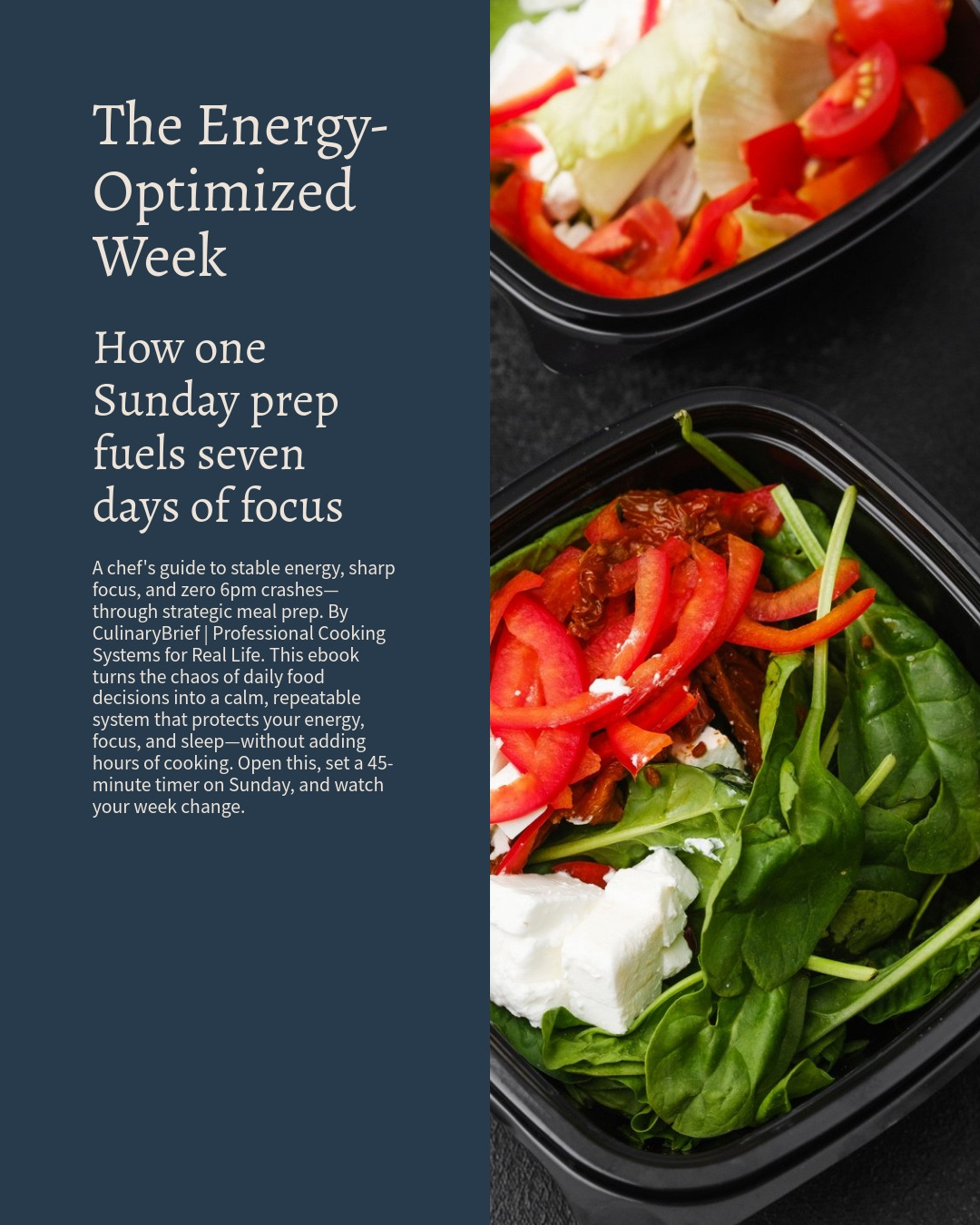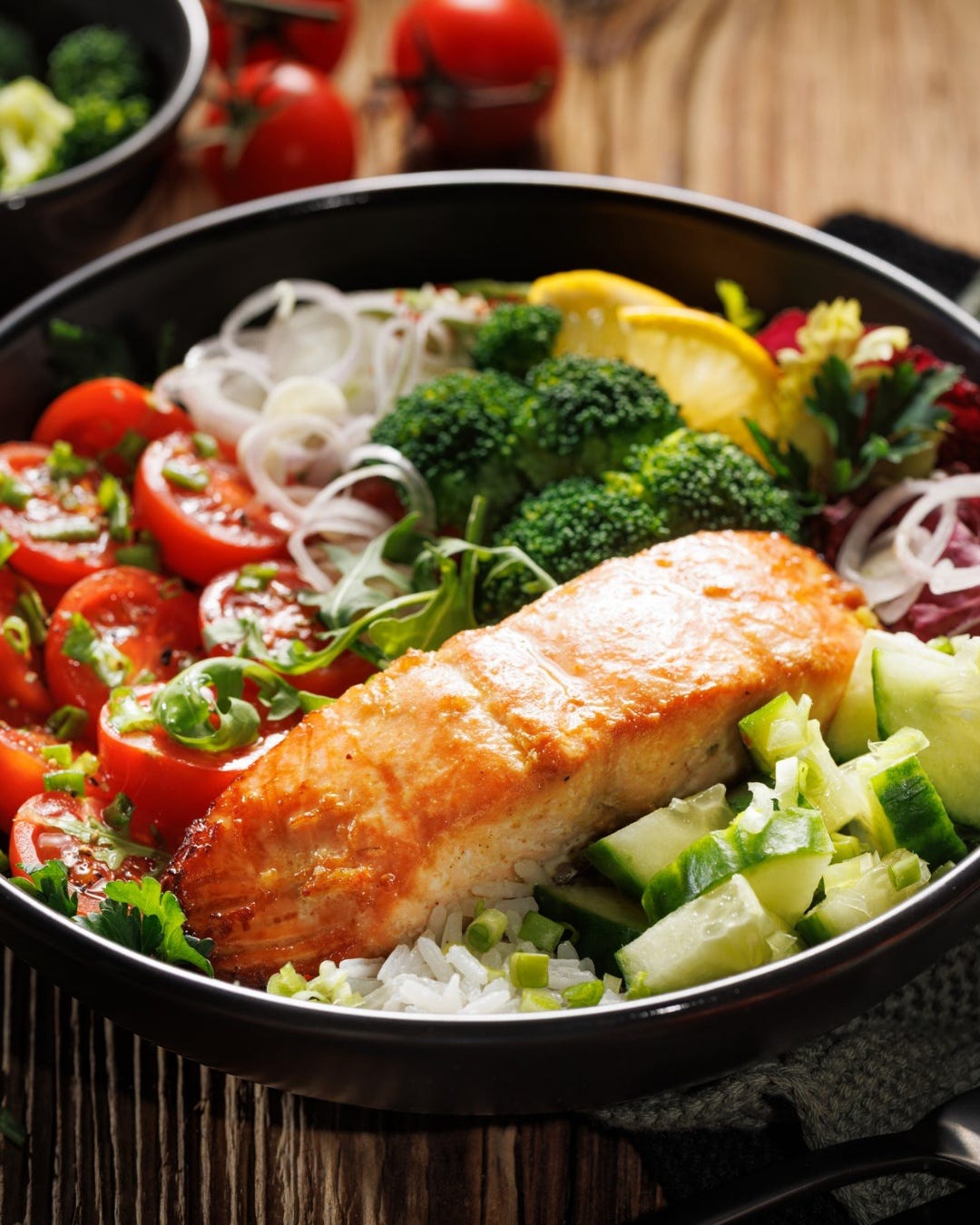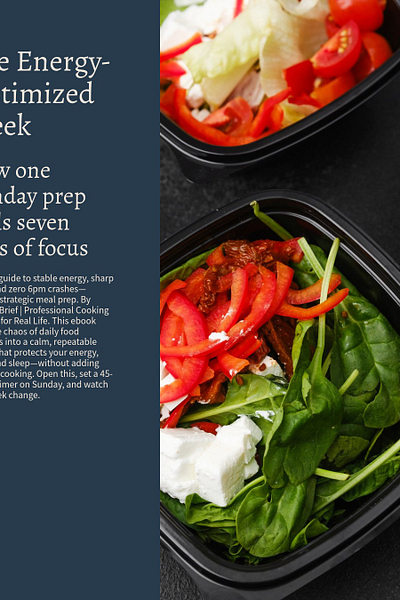I need your honest answer about energy
I’m going to ask you something, and I want you to actually think about your answer.
How many times this week did you feel that 3pm energy crash?
You know the one. Where you’re staring at your screen, re-reading the same sentence three times, and seriously considering a third coffee even though you know it’ll just make you jittery and mess up your sleep.
Reply with a number: 0, 1-2, 3-4, or “every single day”
I’m asking because I’m about to make a case for something that sounds completely unrelated to your afternoon energy levels.
I’m going to tell you that what you prep on Sunday directly determines whether you’re sharp on Wednesday or running on fumes.
And I need to know if that even resonates with you, or if I’m completely off base.
Here’s what I’ve noticed (working as a chef)
When I work back-to-back 12-hour shifts, my energy is either completely stable or completely wrecked. There’s no in-between.
The difference? Whether I prepped my meals on my day off or not.
Not because meal prep saves me time (though it does).
Not because it’s “healthier” in some abstract way.
But because when my meals are already decided and ready to assemble, my blood sugar stays stable. When they’re not, I grab whatever’s fast—and crash two hours later.
It’s that simple. And that predictable.
The thing nobody talks about with meal prep
Everyone talks about meal prep like it’s about organization. Like if you’re “disciplined enough” to cook on Sunday, you’ll eat better during the week.
But that completely misses the point.
Meal prep isn’t about discipline. It’s about energy optimization.
When you prep strategically—focusing on ingredients that stabilize blood sugar, support brain function, and prevent crashes—you’re not just saving time. You’re protecting your ability to focus, make decisions, and not feel like garbage by Wednesday afternoon.
That’s what this week’s guide is about.
The Energy-Optimized Week
I built a full system around this idea: What if your Sunday prep was designed specifically to fuel stable energy for seven days?
Not just “healthy meals.” Not just “batch cooking.”
But meals designed around:
Omega-3s for brain function and focus
Magnesium for converting food into actual cellular energy
B-vitamins for sustained energy production
Complex carbs that release slowly (no spikes, no crashes)
Four complete meals. One 45-minute Sunday session. Seven days of stable energy.
Here’s what’s inside:
Meal 1: Omega-3 Power Bowl Turmeric-roasted salmon with quinoa and greens. This is your Monday reset—ingredients that actively support focus and mental clarity.
Meal 2: Magnesium-Rich Lentil Bowl Moroccan-spiced lentils with roasted sweet potato and kale. Magnesium is the mineral your body uses to convert food into ATP (actual usable energy). This is your midweek grounding meal.
Meal 3: B-Vitamin Energy Bowl Herb-roasted chicken with quinoa and rainbow vegetables. B-vitamins are essential for energy conversion. This prevents the Wednesday afternoon crash.
Meal 4: Evening Wind-Down Bowl Walnut-kale salad with your choice of protein. Lighter, easier to digest, designed so your body can focus on rest instead of digestion.
Plus:
Complete 45-minute Sunday prep timeline
Shopping list under $45
The science behind why these ingredients work (kept simple, I promise)
Assembly instructions for each meal (8-12 minutes max)
But here’s what I actually want to know
Before you download it (or don’t), I need your feedback.
Because here’s the thing: I can keep sending you meal plans every Thursday. That’s easy for me to create.
But I don’t know if that’s actually what you need.
So tell me honestly:
Question 1: How many times this week did you experience the 3pm energy crash? (Reply with: 0, 1-2, 3-4, or “every single day”)
Question 2: Does this “energy optimization” angle make sense to you, or does it feel like I’m overcomplicating meal prep? (Reply with: “Makes sense” or “Too much”)
Question 3: If you could ask me one question about maintaining energy through food, what would it be?
Just hit reply. Or Leave a Comment. I read and respond to every single email.
Because if the meal plans I’m sending don’t actually match what you’re struggling with, I’d rather know now so I can adjust.
Why I’m asking
I’ve been sending meal plans for a few weeks now, and honestly? I have no idea if they’re helping you.
Some of you are opening these emails (thank you). Some of you are downloading the PDFs. But I don’t know if you’re actually using them. Or if they’re sitting in a folder labeled “Someday When I’m More Organized.”
And I can’t keep creating content in a vacuum.
So this week, I’m trying something different. I’m asking you directly:
What do you actually need from these Thursday emails?
Do you want full meal plans like this one? (Four meals, complete system)
Do you want shorter, simpler guides? (One hero recipe that spins into 3-4 variations)
Do you want more of the “why” behind the techniques? (The science, the chef knowledge)
Do you want less nutrition talk and more practical cooking tips?
There’s no wrong answer. I just want to make sure I’m creating something you’ll actually use.
So reply and tell me. Even if it’s just “The energy thing resonates” or “I just want simple recipes.”
I’m mapping out December content this week, and your answer will literally shape what I create.
In the meantime
Here’s your Energy-Optimized Week system. Four meals designed to keep your blood sugar stable, your focus sharp, and your energy consistent from Monday through Friday.
Total prep time: 45 minutes on Sunday Total grocery cost: Under $45 Weeknight assembly: 8-12 minutes per meal
And if you try even one of these meals, reply and let me know which one. I’m genuinely curious what lands and what doesn’t.
Thanks for being here. And for reading all the way to the end.
— Tyler
P.S. If you know someone who’s exhausted by Wednesday every week and survives on coffee and complains about having “no energy” forward them this email. The Energy-Optimized Week might be exactly what they need.
P.P.S. Seriously, hit reply with your answers to those three questions. I’m not just being polite, I actually need to know this stuff to make these emails better for you.




0
Makes sense
What are good options for people living on low income?